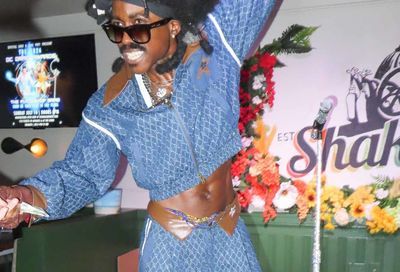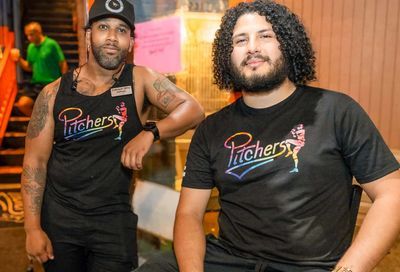ANC Rainbow Caucus urges DC Council to ban LGBTQ “panic” defenses
Bill's passage has been delayed by COVID-19 pandemic and increased workload for Judiciary Committee

Last week, the D.C. Council’s Committee on the Judiciary and Public Safety approved an omnibus public safety bill that bans defendants from attempting to use a victim’s sexual orientation or gender identity to justify a less severe sentence for violent crimes.
The bill, known as the “Bella Evangelista and Tony Hunter Panic Defense Prohibition and Hate Crimes Response Amendment of 2020,” would ban the use of the gay and trans “panic” defense in criminal cases where an LGBTQ individual is a victim of a bias crime.
The most recent bill was introduced in September 2019 in response to calls from local advocates who argued that the defense tactic amounts to victim-blaming.
Several other states have successfully passed similar legislation, which made it all the more curious when the Council did not move forward with the legislation.
Among the groups pushing for the legislation were the ANC Rainbow Caucus, a collective comprised of the out LGBTQ Advisory Neighborhood Commissioners in all eight wards.
In a November email, Japer Bowles, a Ward 1 ANC Commissioner and the chair of the caucus, implored councilmembers to move forward with the legislation so that it could pass before the end of the year, during the current Council session.
“Although likely to be re-introduced if not enacted, this continued delay for a bill that presumptively has unanimous support is asinine and disrespectful of the work that advocates have done,” Bowles said in an email to members of the Judiciary Committee and Council staff.
The Council held a markup session on the bill last Monday, passing the bill unanimously and setting it up for first and second readings at meetings of the full Council on Dec. 1 and Dec. 15.
All five members of the Judiciary Committee expressed support for the bill.
“While any crime can undermine a victim’s sense of security and well-being, hate crimes are especially disturbing,” Judiciary Committee Chairman Charles Allen (D-Ward 6) said at last week’s hearing. “The victims of hate crimes are, according to the American Psychological Association, more likely to experience post-traumatic stress, safety concerns, depression, anxiety and anger than victims of crimes and bias.
“Additionally, hate crimes affect not only the specific individual target, but they send a message to an entire group of people that they are unwelcome or unsafe,” he added. “Panic defenses are legal defenses that judges or juries to find that a victim’s traits or characteristics are to blame for a defendant’s conduct.”
See also: Colorado bill barring gay and trans panic defense heads to governor for signature into law
Councilmember Brooke Pinto (D-Ward 2), the newest councilmember, who won a special election earlier this summer, noting that research shows that one in five gay, lesbian, or bisexual people, and one in four transgender people, will experience a hate crime at some point in their lifetimes.
“This legal strategy frequently draws on stigmas particular to the LGBTQ+ community, their sexualities or genders to justify horrific violence against these individuals. The defense is rooted in homophobia and transphobia,” she said. “Let me say categorically that there is no place for any type of crime in the district and there are certainly no place for bias-motivated hate crimes in our city. But this important bill no longer will defendants be able to justify, excuse or mitigate their violent and egregious, unacceptable conduct with this bill.”

Bowles told Metro Weekly in an interview prior to the markup hearing that those within the local LGBTQ community have been frustrated by the slow pace at which the bill has advanced in the 14 months since it was first introduced.
“The people in the community feel like we’ve got our due diligence with this bill,” Bowles said. “We’ve massaged it. We’ve even incorporated it in our campaigns. And it’s really kind of a low-barrier piece of legislation. There’s about a dozen other jurisdictions that have already banned the gay or trans panic defense. So there’s already model legislation out there that councilmembers could literally just copy and paste.”
While he has no doubt that the bill will likely pass by unanimous vote, the question is whether the Council, as currently comprised, will beat a looming deadline before a new Council takes office in January and the bill has to be re-introduced.
“I don’t count my chickens until they’ve hatched,” Bowles said, even as he acknowledged that the members of the Council, including Allen, have been strong allies on past LGBTQ-related measures. “And that’s because this council says a lot of stuff, and the mayor says a lot of stuff, and a lot of it’s just talk, honestly. So unfortunately, it’s going to be a really tight time frame. The council didn’t have to make it such a Herculean task to pass it. They literally had all year.”
See also: Montgomery County Councilmember Evan Glass introduces LGBTQ Bill of Rights
But Ward 3 ANC Commissioner Monika Nemeth, the incoming chair of the Rainbow Caucus, conceded that the speed with which the Council could have moved was disrupted by the COVID-19 pandemic and the inability to meet in person.
“The only issue has been, as far as I can tell, in previous conversations I’ve had with Charles Allen, is the Judiciary Committee gets the bulk of the bills at Council. The highest volume of bills when any committee goes through Judiciary,” Nemeth noted. “And so they always have a big workload so that it just takes some time to get through things.”
Nemeth told Metro Weekly she looked forward to the bill being passed before the end of the year, saying she doesn’t expect any councilmember to oppose its final passage.
“I don’t think the bill hasn’t come to fruition out of any maliciousness or any opposition at the council. I think it’s just circumstances that that the Judiciary Committee is overworked. They have a tremendous backlog,” she said. “They have a tremendous volume of bills coming through there. And then COVID certainly complicated just the workflow process, the meeting schedule and such. I think it was just caught up in circumstances. And now as the end of the council period is approaching, they’re scrambling to get things done.”
Read more:
Sean Patrick Maloney, openly gay congressman, wants to be Democrats’ elections “quarterback” in 2022
John Aravosis is driven by a desire for change — and he’s not stopping post-Trump
Support Metro Weekly’s Journalism
These are challenging times for news organizations. And yet it’s crucial we stay active and provide vital resources and information to both our local readers and the world. So won’t you please take a moment and consider supporting Metro Weekly with a membership? For as little as $5 a month, you can help ensure Metro Weekly magazine and MetroWeekly.com remain free, viable resources as we provide the best, most diverse, culturally-resonant LGBTQ coverage in both the D.C. region and around the world. Memberships come with exclusive perks and discounts, your own personal digital delivery of each week’s magazine (and an archive), access to our Member's Lounge when it launches this fall, and exclusive members-only items like Metro Weekly Membership Mugs and Tote Bags! Check out all our membership levels here and please join us today!


























You must be logged in to post a comment.